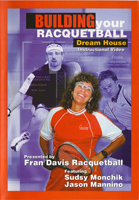Won and Lost Record….Does it Matter?
[caption id="attachment_1646" align="alignright" width="150"] Coach Fran Davis[/caption] Does your record matter? Real winners know that when they lose they need to work on specific skills, strategies, techniques, drill more, read more mental toughness books, and sharpen the area that cost them the match. They are not losers in life because they lost a match; they are winners in life because they are willing to go back to the trenches and work even harder on their game. Every obstacle in your life is offering you a lesson to be learned. The courageous athletes say, “Bring it on!” (more…)










